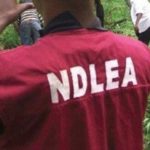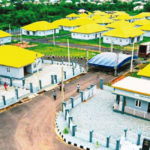The African Regional Organisation of the International Trade Union Confederation (ITUC-Africa) is poised to end the horrendous and disheartening stories of dreadful conditions many migrant workers experience in the course of seeking better living wage. Comrade Odigie Akhato Joel, the Deputy General Secretary of ITUC-Africa and an activist, in this interview with CHRISTIAN APPOLOS, says unfair labour practice is a menace that should not have a place in any human society. He added that his organisation is working tirelessly to change the narrative.
WHAT is the nature of the work ITUC-Africa does?
ITUC-Africa is the African regional umbrella body of the International Trade Union Confederation, with its headquarters in Lome, Togo. It is made up of 56 national trade union federations from 45 countries, and represents a total of 15 million workers.
ITUC-Africa undertakes work on migration and similar other work. We are very active in our struggle for social protection for all in Africa, including migrant workers. At the moment, we are joining the global trade union movement in a very strong call for a social protection fund. ITUC-Africa is also very active on the issue of protecting human and trade union rights. So, as a trade union organisation, protecting rights, human labour rights is the essence of our work.
ITUC-Africa is also very active on the issue of women and youths empowerment. We are very passionate about issues around equality. Our continent is filled with youths, so we think it is necessary to begin to engage governments and state actors in Africa and draw their attention to the need to develop robust policies and programmes that will address the issues in a very productive manner.
We are seriously involved in the issue of climate change. Our voice is very strong and our position is very clear. We are involved in the issue of trade and tax justice. That is why on the issue of tax justice, we are speaking very loud because if we stop the illicit flow of money from Africa to the western world, Africa will have enough to fund social protection programmes. We are also involved in the issue of occupational health and safety. COVID-19 has taught us that this is an area of work we need to give serious attention.
Presently, we pay serious attention to the issue of migration governance. For a long time, this issue has been on the national and international arena. Sometimes some opportunistic politicians just want to ride on the interest of it to power. We’ve seen that before nationally and internationally. Let me clearly state that migration has never and will never be a crisis, rather the crisis you see is in governance. There is a governance deficit on migration, and on labour migration.
As a trade union organisation, we know there are roles to play because first, migration issues are very important to us. It is a human survival issue. The people who move, majority of them do so for survival. Then secondly, statistics have shown that many people who move are workers who want to live a fulfilled life. So for the fact that they are workers, makes them our person, they are our potential members and of course, we must be involved.
How will your campaign contribute to a better fair recruitment practice, and in dealing with the issue of human trafficking that is largely associated with labour migration?
Labour migration on the continent of Africa gained some kind of visibility and even notoriety on the basis of infractions on the rights of African migrants, notably in the Middle East. But in other parts of the continents you don’t hear, you don’t see this. But in the Middle East, it has become a big one largely on account of the Kafala system, that is the sponsorship system the people adopt.
And against this Kafala system, Africa is not speaking alone, especially the trade unions in Africa. We have undertaken a recalibration that has helped us to identify the need to talk to friends, brothers, sisters, comrades, allies, from outside our continent. We are speaking with trade unions in Asia, and instead of speaking in silos can we speak synergies.
As a result of our efforts in collaborations, our campaign has led to a situation where in Qatar, the Kafala system has been completely reformed in a very progressive manner (exit permit has been removed). Before, if you live and work in the Middle East, and somebody sponsors you, immediately you arrive the person takes your passport and keeps it. That person can detect who you work with, how you work, how long you work and how you are paid. That is why we have said that the Kafala system replicates a modern day slavery.
Today in Qatar, you can no longer confiscate someone’s passport. You can no longer decide for a person when and when not to leave the country. You can no longer choose an employer for a worker. Workers now have rights owing to the reforms outcomes carried out by Qatar. So this reform is a product of the work of ITUC at the global level and ITUC-Africa at our continental level. And we commend the Qatar government. We commend them because their reforms have gone to the extent that they have brought forth a brilliant system that the entire GCC states can copy. That is what we have achieved with our campaign.
I mentioned the Kafala system early. Kafala has modern slavery trafficking element that are attached to it. ITUC-Africa’s study in 2018 shows that even in the recruitment chain of the so-called labour migrants recruiters, there are human traffickers who are posing and fronting themselves as recruiters. In our collaboration with the IOM, we are providing advocacy. We are speaking up and speaking out, and we are engaging relevant governments, organisations and individuals; aiming to mitigate cases of human trafficking especially through labour migration.
At the moment with the AU, we now have a bilateral legal migration guide. The guide is meant to aid fair recruitment. We also have a declaration on the rights of migrant workers. This is also meant to protect migrant workers, even against human trafficking and exploitation in the recruitment process. So our campaigns are on and we are providing education, we’re telling people how to watch and discover potential human traffickers and how not to fall for them. We have at the moment what we call the migration resource advisor. If you want to move, google migration resource advisor, it will provide information on what you can do to protect yourself and how to avoid some exploitative recruiters.
You earlier said one of the focus of your campaign is to stop forced migration. What magic will your campaign do to achieve that?
What we are doing is to use interrelated approaches to achieve the objective. As trade unions in Africa, we are advocating strongly for build-back better initiatives on our continent, which must contain implementing ways of job creation. Many are unemployed. So we are seriously harping on advancing social protection.
To stop forced migration, we’re already speaking more on rights at work; that men and women have got rights when they are working. Employers are bound by law to respect their rights, not to victimize, harass, or pressured them to run away or abandon their rights.
Lastly is our advocacy on resilience. We are advocating for Africa to build a huge capacity for resilience and resilience against civil unrest, resilience against fragility manifesting themselves in different forms in different societies. Building resilience then means the people must be able to improve on building institutions, and most importantly building the capacity of workers. With COVID-19 there is emphasis on re-skilling. A new kind of education that will take cognizance of science and technology; the digital world. These are areas we want presidents, governments and state actors to consider so that we can lessen the crisis of forced migration.
Are you collaborating with trade unions in the Middle East especially in the UAE, Saudi Arabia and other countries within the region. If yes, do we see a future where migrant workers will enjoy absolute fair labour rights?
Let me respond by saying, yes. Trade unions from Africa are reaching out to the unions in the Middle East. For example, under the ILO Fairway Project Nigeria, the Nigeria Labour Congress has reached out to a number of unions in the Middle East. At the moment, the General Federation of Bahrain Trade Unions has responded and said they want to work with the Nigeria Labour Congress.
So they are currently talking to see how they can together improve the issue of the rights of labour migrants from Africa. At the moment, they are heading towards the development of a memorandum of understanding to improve their work. So for me, that is steady progress that can further open more doors for bigger collaborations. So there is hope for bigger and effective collaborations that will support our campaigns and we are supporting them.
YOU SHOULD NOT MISS THESE HEADLINES FROM NIGERIAN TRIBUNE
Viral Voice Note On WhatsApp Billing False
Claim: A viral WhatsApp voice note, purportedly made by the director and CEO of WhatsApp, claims users will have to start paying for WhatsApp services.
Verdict: The viral WhatsApp voice note claim is a hoax. The content is not new and has been circulated as a broadcast message several times in the past.
Experts Say Mixture Of Snail Slime, Evaporated Milk Cannot Cure Stroke
CLAIM: A Facebook user claims water gotten from snails (snail slime) and peak milk can cure partial or full stroke.
VERDICT: The claim that water gotten from snails (snail slime) and peak milk can cure partial or full stroke is false.
FULL STORY: On July 26, 2020, a Facebook user, Prince Nnamdi Enyinnaya Emelelu Eluwa, in a post claimed that water gotten from snails (Snail slime) and peak milk can cure partial or full stroke. The post which is over a year old has recently been reshared by other Facebook users.
Marburg Virus: What You Need To Know About Disease Recently Detected In West Africa
On Monday, August 9, 2021, the World Health Organisation (WHO) confirmed the first case of Marburg virus in West Africa in Guinea. This development has sent shivers down the spines of West Africans who are still grappling with the effects of the coronavirus pandemic. But before this dreaded disease is greeted by rumours and misinformation, here is what you have to know about the virus.APC states to establish Health Emergency Trust Fund…
FACT CHECK: US Did Not Give Nigeria 48 Hours Ultimatum To Detain Abba Kyari
CLAIM: Several social media posts claim the United States of America (USA) gave Nigeria’s Federal Government 48 hours to detain suspended Deputy Police Commissioner, Abba Kyari, or face severe sanctions.
VERDICT: The claim is false and misleading. The US did not give Nigerian Federal Government 48 hours ultimatum to detain Abba Kyari.






